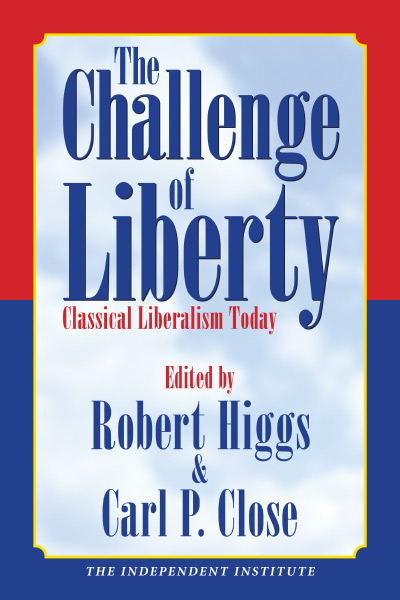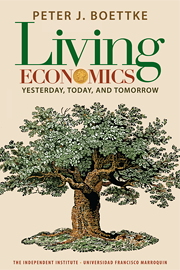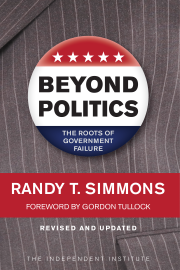| List Price: | ||
| Price: | $16.95 | |
| Discount: | $3.00 (Save 15%) |
| List Price: | ||
| Price: | $16.95 | |
| Discount: | $3.00 (Save 15%) |
Overview
The quest for freedom has always been as much a battle of ideas as it is a popular struggle. Classical liberal pioneers such as John Locke and Adam Smith stressed the inherent worth of the individual, inalienable rights, and the benevolent consequences of the cooperative, peaceful pursuit of one’s own happiness. These ideas became the intellectual scaffolding for much of the West’s most fundamental institutions and achievements. Yet after its 19th-century high-water mark, classical liberalism lost much of its passion, focus, and popular support. Intellectual trends increasingly began to support coercive egalitarianism, empire, and central planning at the expense of individual liberty, personal responsibility, private property, natural law, and free institutions.
But the eclipse of classical liberalism by contemporary liberalism and conservatism is passing. The Challenge of Liberty restores the ideas and ideals of classical liberalism and shows how its contemporary exponents defend such pillars of free societies as individual rights, human dignity, market processes, and the rule of law.
Contents
- Introduction: The Challenge of Classical Liberalism -- Robert Higgs and Carl P. Close
- Part I: Is Classical Liberalism Still Vital?
- The Soul of Classical Liberalism -- James M. Buchanan
- Economics with Romance -- Dwight R. Lee
- From Smith to Menger to Hayek -- Steven Horwitz,
- Liberalism, Loose or Strict -- Anthony de Jasay
- Part II: Freedom and the Moral Society
- On the Nature of Civil Society -- Charles K. Rowley
- Liberty, Dignity, and Responsibility -- Daniel B. Klein
- Moral Capital and Commercial Society -- Suri Ratnapala
- Liberalism and the Common Good -- Linda C. Raeder
- Part III: Securing Freedom
- Securing Constitutional Government: -- Suri Ratnapala
- The Primacy of Property in a Liberal Constitutional Order: Lessons for China -- James A. Dorn
- The Will to Be Free: The Role of Ideology in National Defense -- Jeffrey Rogers Hummel
- The Inhumanity of Government Bureaucracies -- Hans Sherrer
- Part IV: Individualism versus "Group Think"
- Freedom of Religion and Public Schooling -- James R. Otteson
- Is National Rational? -- Anthony de Jasay
- A Critique of Group Loyalty -- Laurie Calhoun
- The Therapeutic State -- Thomas S. Szasz
- Part V: Classical Liberals Respond to Their Critics
- What Is Living and What Is Dead in Classical Liberalism? -- Charles K. Rowley
- The Ways of John Gray: A Libertarian Commentary -- Daniel B. Klein
- An Original Omission? Property in Rawls's Political Thought -- Quentin P. Taylor
- Has John Roemer Resurrected Market Socialism? -- Michael Wohlgemuth
Detailed Summary
• “The founding of the American Republic and to varying degrees the 19th century constitutions of many European states, along with the relative peace, growing international trade, and buoyant spirit of progress and optimism that spread across Europe and beyond before World War I, constituted victories for classical liberalism.... As the works of the classical liberal economists were disseminated across the Western world, their enemies took note.” —Robert Higgs and Carl P. Close (Introduction)
• “Classical liberals...quite literally went to sleep during the decade of the 1980s, especially after the death of socialism both in idea and in practice. The nanny-state, paternalist, mercantilist, rent-seeking regimes in which we now live emerged from the vacuum in political philosophy.”—James M. Buchanan (ch. 1)
• “Locke tried with his innocent-looking proviso to prove the legitimacy of ownership and succeeded in undermining its moral basis. John Stuart Mill thought he was defending liberty, but he ended up shackling it in strands of confusion.”—Anthony de Jasay (ch. 4)
• “Liberty and dignity complement one another. Their mutual dependence helps to explain why the price of liberty is vigilance. Encroach on liberty this morning and you cause an erosion of dignity this afternoon, which itself will generate a new encroachment on liberty tomorrow, and so on.”—Daniel B. Klein (ch. 6)
• “No government, no matter how undemocratic, rules for long through brute force alone. Enough of its subjects must accept its power as necessary or desirable for its rule to be widely enforced and observed.” —Jeffrey Rogers Hummel (ch. 11)
• “Formerly, people rushed to embrace totalitarian states. Now they rush to embrace the therapeutic state. By the time they discover that the therapeutic state is about tyranny, not therapy, it will be too late.” —Thomas S. Szasz (ch. 16)
Classical liberal pioneers such as John Locke and Adam Smith stressed the inherent worth of the individual, inalienable rights, and the benevolent consequences of the cooperative, peaceful pursuit of one’s own happiness. These ideas became the intellectual scaffolding on which stood the political freedom, civic participation, and growing prosperity that came to define the West. Yet after classical liberalism’s 19th-century high water mark, many influential thinkers came to favor coercive egalitarianism, empire, and central planning at the expense of individual liberty, personal responsibility, private property, natural law, and free institutions.
In recent years, however, a renaissance in classical liberal thought has begun. In The Challenge of Liberty: Classical Liberalism Today, edited by Robert Higgs and Carl P. Close, eighteen economists, historians, and philosophers re-establish the ideals of classical liberalism and show how it supports such pillars of free societies as individual rights, human dignity, market processes, and the rule of law.
Is Classical Liberalism Still Vital?
What do classical liberal scholars see as the main challenges confronting their movement? What do classical liberals think they should emphasize in order to win more adherents in the battle of ideas? How can their “intellectual” gains best be translated into “practical” gains in the real world? The questions are timely because despite the collapse of the Soviet bloc and the abandonment of collectivist economic planning in the 1990s, classical liberalism must overcome an uninspiring political pragmatism that has contributed to a resurgence of statism and further entrenchment of special-interest groups.
For classical liberals to strengthen their public following, reverse the trend toward statism and promote liberty, they should articulate a moral vision as compelling as that of the early classical liberals’ antislavery campaigns, argues Nobel Prize–winning economist James M. Buchanan, in chapter 1, “The Soul of Classical Liberalism.” Dwight R. Lee replies to Buchanan in chapter 2, “Economics without Romance,” arguing that classical liberals should resist depictions of a future classical liberal utopia and instead simply infuse their freemarket economics with a greater sense of urgency.
Classical liberals can gain traction in the scholarly world by correcting misconceptions about their intellectual heritage. Both the left and the right, for example, have recently attacked the classical liberals for their alleged assumptions of “hyperrationalism” and “extreme atomism.” But, as Steven Horwitz explains in chapter 3, “From Smith to Menger to Hayek: Liberalism in the Spontaneous-Order Tradition,” those criticisms fall flat when directed at the classical liberals of the Scottish Enlightenment tradition, who argued that many useful human institutions (including language and the market) are not the result of conscious design but are unintended consequences of social interaction. In chapter 4, “Liberalism, Loose or Strict,” Anthony de Jasay explains how genuine liberalism was corrupted by utilitarian doctrines in the 19th century, paving the way for contemporary welfare-state liberalism. For genuine liberalism to resist anti-liberal ideas, it must affirm vigorously two basic principles: the presumption of freedom and the rejection of the rules of submission to political authority, he argues.
Freedom and the Moral Society
Classical liberals argue that liberty fosters not only economic progress but also moral conduct. As John Locke and the younger John Stuart Mill suggested, the network of institutions that comprise civil society reward and reinforce numerous virtues and thereby promote social harmony, explains Charles K. Rowley in chapter 5, “On the Nature of Civil Society.”
In chapter 6, “Liberty, Dignity, and Responsibility: The Moral Triad of a Good Society,” Daniel B. Klein argues at length that liberty and individual responsibility preserve and affirm the dignity of the individual. Furthermore, understanding the interdependence among liberty, dignity, and responsibility is essential for broadening support for a free—and good—society. In chapter 7, “Moral Capital and Commercial Society,” Suri Ratnapala argues that commerce coevolves with moral rules and leads not only to prosperity but also to the accumulation of moral capital—the disposition to moral conduct—as Adam Smith and David Hume observed.
Modern liberalism has been criticized not only by conservatives and classical liberals, but also by communitarians, who charge that its advocacy of a wide range of “rights” undermines ethical communities. Linda C. Raeder, in chapter 8, “Liberalism and the Common Good: A Hayekian Perspective on Communitarianism,” argues that F. A. Hayek’s brand of classical liberalism is not vulnerable to the communitarian critique of modern liberalism and is at least partly sympathetic to the communitarians’ vision of the good society.
Securing Freedom
Constitutionalism, a product of classical liberalism, is a worldwide work in progress: Although every country in the world claims to have a constitution, most of the world’s people do not live under constitutional government. Only societies that have adopted a particular conception of the rule of law have secured constitutional government and therefore freedom, argues Suri Ratnapala in chapter 9, “Securing Constitutional Government.” Whether citizens of China become free, for example, hinges on whether their government adopts a constitution that protects persons and property against arbitrary government power and lays a framework for freedom under the rule of law. Just as Adam Smith articulated the principles of liberalism in the West, so the wisdom of Lao Tzu can play a similar role in China’s transition from market socialism to “market Taoism,” explains James A. Dorn in chapter 10, “The Primacy of Property in a Liberal Constitutional Order: Lessons for China.”
The rule of law is not the only pillar of constitutionalism; other ideas must also be widely understood—and safeguarded with eternal vigilance. In chapter 11, “The Will to Be Free: The Role of Ideology in National Defense,” Jeffrey Rogers Hummel argues that the role of ideology in determining military outcomes—both between nationstates and between individuals and the nation-state—has been long overlooked. In chapter 12, “The Inhumanity of Government Bureaucracies,” Hans Sherrer argues that irresponsibility, moral relativism, ruthless opportunism and sadism are the predictable outcomes of the politicization of society and the government bureaucracy it fosters.
Individualism versus “Group Think”
Classical liberalism has a strong affinity for freedom of conscience, as against intellectual conformity. The early classical liberals’ insistence on cognitive independence gave rise to protections of freedom of speech and the separation of church and state in the United States. In chapter 13, “Freedom of Religion and Public Schooling,” James R. Otteson argues that like coercive funding of religion, coercive funding of education violates freedom of conscience, politicizes and trivializes important values, and violates rights.
In chapter 14, “Is National Rational?,” Anthony de Jasay argues that the case against nationalism, historically one of the greatest threats to individualism, is stronger than most classical liberals realize. In chapter 15, “A Critique of Group Loyalty,” Laurie Calhoun complements de Jasay’s analysis by arguing that a commitment to group loyalty must come at the expense of one’s other principles and thus is irrational for moral absolutists and moral relativists alike. A grave and gathering new threat to individualism and liberty has met little organized opposition, according to Thomas Szasz in chapter 16, “The Therapeutic State: The Tyranny of Pharmacracy.” Joining the traditional rationalizations for state coercion—“God’s will,” “the consent of the governed,” and “social justice”—comes a fourth: “coercion as treatment,” Szasz explains.
Classical Liberals Respond to Their Critics
The Challenge of Liberty concludes with replies to recent criticism leveled against classical liberalism. In chapter 17, “What Is Living and What Is Dead in Classical Liberalism?,” Charles K. Rowley explains Robert Nozick’s and John Gray’s movement away from classical liberalism as a shift from a commitment to the philosophy of John Locke toward that of Thomas Hobbes. In chapter 18, “The Ways of John Gray: A Libertarian Commentary,” Daniel B. Klein argues that Gray has misrepresented classical liberal ideas and has failed to hold his own ideas to the same standards that he demands of his classical liberal opponents.
John Rawls, perhaps the most influential political philosopher of the 20th century, barely broached the subject of property and ownership. Because this topic is so vital in the real world and in the history of political thought, Rawls’s theory of “justice as fairness” must be considered very incomplete, argues Quentin P. Taylor in chapter 19, “An Original Omission? Property in Rawls’s Political Thought.” In chapter 20, “Has John Roemer Resurrected Market Socialism?,” Michael Wohlgemuth argues that the “market socialism” espoused by economist John Roemer is vulnerable to the same devastating criticisms against socialism leveled in the 20th century by Austrian school economists Ludwig von Mises and F. A. Hayek, who forcefully argued that a smoothly operating economy requires free-market pricing, profit-and-loss incentives, capital markets, and private property.
Praise
“The continuing vitality and relevance of the classical liberal tradition is on ample display in The Challenge of Liberty, the excellent book edited by Robert Higgs and Carl Close. The voices are fresh, insightful, and on occasion, provocative. The book is an ideal entree to recent debates and discussions that have taken place both within the tradition and with those who oppose it.”
—Bruce J. Caldwell, Professor of Economics, University of North Carolina, Greensboro
“The Challenge of Liberty is a big and very comprehensive book, which deserves the attention of a wide swath of scholars. This would include, on the one hand, a scrupulously careful re-examination of the intellectual roots of Western political and economic institutions, beginning mainly with the seminal writings of John Locke and Adam Smith. As if that were not enough, the second half of the book focuses on present-day policy concerns and the relevance of Classical Liberalism Today (the book’s subtitle). Many of these concerns center, not surprisingly, upon the coercive powers of that modern Leviathan of large government bureaucracies. The 16 authors who contributed to this volume have maintained consistently high standards of scholarship, as well as a refreshing capacity to provoke readers into a reconsideration of long-held views.”
—Nathan Rosenberg, Fairleigh S. Dickinson, Jr., Professor of Public Policy (Emeritus), Stanford University
“This splendid book by some of today's greatest thinkers, examines the state of classical liberal ideas in the modern world. Applying the ideas of Locke and Smith to questions of defense, health, education, and commerce, The Challenge of Liberty will be most helpful in restoring the ideas and ideals of true (i.e., classical) liberalism as the intellectual and cultural roots of free societies regarding individual rights, human dignity, market processes, and the rule of law."
—Alex Kozinski, Judge, U. S. Court of Appeals, 9th Circuit
“The Challenge of Liberty is an ambitious and persuasive effort to demonstrate the relevance of classical liberal doctrine to modern times. This liberal doctrine has little in common with what passes for ‘liberalism’ in the contemporary political discourse.”
—Richard E. Pipes, Baird Professor of History Emeritus, Harvard University
“The Challenge of Liberty follows the best tradition of classical liberal thought and, in its effort to update the premises of classical liberalism, challenges with solid arguments many of the myths of our times.”
—Mario Vargas Llosa, author, The Time of the Hero, The War of the End of the World, and A Fish in Water
“Classical liberal thought centers on the understanding of the separate and fundamental importance of each individual. This insight underwrites the basis for individual rights, private property, voluntary association, spontaneous social and economic order, and radical limits on the role of any coercive institution. The marvelous book, Challenge of Liberty, now provides probing and illuminating examinations of the nature of the case for liberty and of its standing in the present intellectual world and the prospects for its future influence.”
—Eric Mack, Professor of Philosophy, Tulane University
Author
Robert Higgs is Senior Fellow in Political Economy at The Independent Institute, author of Against Leviathan and Crisis and Leviathan, and editor of the scholarly quarterly journal, The Independent Review.
Carl Close is the Academic Affairs Director of the Independent Institute in Oakland, Calif. and assistant editor of The Independent Review: A Journal of Political Economy.















